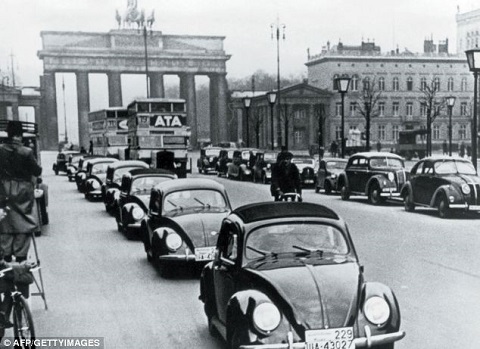Published June 3, 2015, Los Angeles Daily Journal – The Porsche brand is about as iconic as they come. Built on decades of precise German engineering, the brand is the pinnacle of automotive excellence. They have raced in everything from the 24 Hours of Le Mans to Formula One, and have danced in minds of millions who have dreamed of owning one. To drive one, they say, is to steal a page from the innocent days of youth.
The company was founded in 1948 by Ferdinand Porsche, the Czech-born engineering marvel who was one of the greatest contributors to early 20th century automotive development. Few are likely aware that Ferdinand Porsche invented the first gasoline-electric hybrid automobile, the Lohner-Porsche “Semper Vivus” (translated as “Always Alive”), which in 1901 was capable of reaching 35 mph. Few are also likely aware that he designed the Volkswagen Beetle, and was instrumental in founding the Volkswagen automotive juggernaut.
Yet for all of his contributions, there is one distinction that Ferdinand Porsche will never escape: war criminal.
At the 1933 Berlin Motor Show, German leader Adolf Hitler announced his intention to motorize the nation by ensuring that every citizen could own either a car or a tractor. In June 1934, the Nazi-controlled German Reich Automobile Industry Association awarded Ferdinand Porsche a contract to produce a series of prototypes for a high-volume, low-cost automobile called the “KdF-Wagen” (standing for Kraft durch Freude, or “Strength through Joy”). Porsche later convinced Hitler to change the name to Volkswagen, or the “people’s car.”
Following receipt of the Volkswagen contract, Porsche developed deep ties with the Nazi regime. At Hitler’s urging, Porsche denounced his Czechoslovakian citizenship and became a member of the Nazi party, as well as Hitler’s much-feared military organization the Schutzstaffel, or the “SS.” With funding from the Third Reich, in 1938 Porsche oversaw the development of the first Volkswagen factory in Wolfsburg, Germany, and at the Berlin Motor Show in 1939 he introduced the first production-ready Beetle.
When Germany invaded Poland in September 1939, starting World War II, Porsche’s plant was converted to a German military operation, staffed largely with prisoners-of-war. During these years, Ferdinand Porsche served as head of the German Tank Commission, where he oversaw production of the Tiger I, Tiger II, Elefant, and Panzer VIII Maus.For his efforts, Porsche was awarded SS-Ehrenring (the “SS Honor Ring”) and the War Merit Cross, the successor to the German Iron Cross.
It is reported that at the war’s end in 1944, 90 percent of Volkswagen’s workforce was non-German. Today, the Volkswagen Group, which is still based in Wolfsburg, Germany, is the second largest car manufacturer in the world, selling over 10 million cars annually.
On December 15, 1945, French authorities arrested Ferdinand Porsche on charges of being a war criminal. Porsche was imprisoned for 22 months before his son, Ferry Porsche, was able to buy his freedom. In 1948, Ferdinand and his son Ferry formed the Porsche automobile company we know today, called Porsche AG.
What is perhaps most surprising about Ferdinand Porsche’s story is that it is not necessarily unique. The French car company Renault, started in 1899 by French industrialist Louis Renault, lived a similar past.
In May 1940, when Germany invaded France, the Renault car company fell to the control of Nazi Germany. Over a period of four years, Renault produced 34,232 vehicles for the German army, and is rumored to have been paid $120 million, the equivalent of $1.6 billion in 2015 dollars.
On September 22, 1944, Louis Renault was arrested by the French authorities as a war criminal for collaborating with Nazi Germany. He died just four weeks later, with his family claiming that he was severely beaten. An x-ray taken after his death confirmed that he had a broken neck vertebra.
On January 1, 1945, just three months after he died, France seized and nationalized the Renault car company by order of General Charles de Gaulle. Louis Renault, who was never tried, was posthumously charged with “guilty enrichment obtained by those who worked for the enemy.” At the time the company was nationalized, Renault’s wife Christiane and her son Jean-Louis owned 95 percent of the company stock, and had received nothing for their shares.
Renault’s heirs have twice attempted to challenge France’s nationalization of the car company. In 1954, Renault’s wife and son were told by a French court that they could not challenge the order by the de Gaulle government. In March 2010, France enacted a law allowing citizens to challenge the challenging the nationalization. In 2011, seven of Renault’s heirs attempted to use this law to overturn the nationalization, but the court ruled that it did not have jurisdiction of consider the matter.
The Renault car company, which now owns a 43 percent controlling stake in Nissan, has built a Renault-Nissan alliance that puts it at the fourth largest automaker in the world. Put another way, one out of every 10 cars sold in the world is manufactured by the Renault-Nissan alliance. The Renault estate has never received any form of compensation for what the forward-thinking industrialist created.
We shall soon not forget the devastation created by the Second Great War, or the history of those who participated in it. The war claimed an astonishing 60 million lives — some 3 percent of the world’s then-population — and shattered the lives of countless more for the loss of friends, family and countrymen. Time moves on, but let us never forget our past.
